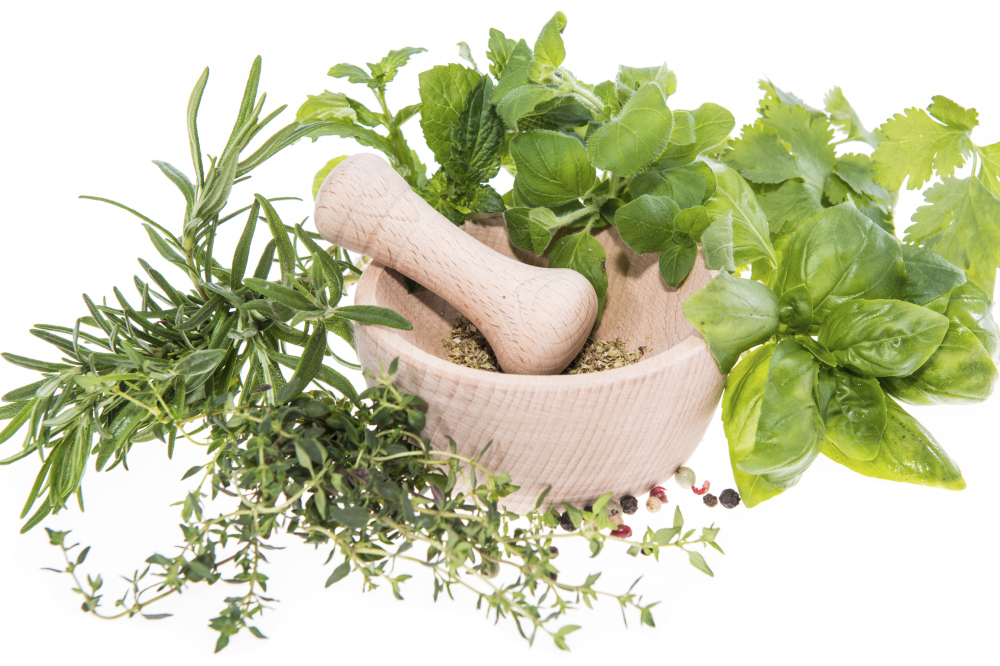
Fresh herbs don't only add flavour to meals
We all know that herbs bring depth, flavour and aroma to all types of culinary dishes but the fresh pots of herbs that sit on our kitchen windowsill can do so much more than that.
Nutritionist, journalist and TV presenter, Lowri Turner, is passionate about the nutritional benefits eating herbs can provide. Lowri says: “People tend to see herbs as just flavouring, but they are actually a power house of nutrition, packed full of antioxidants. A study published in the Journal of nutrition in 2003 found that herbs are higher in antioxidants than fruit and some vegetables!
“I always tell my nutrition clients that if they're trying to get their 5-a-day, adding fresh herbs can help. For example, add a handful of fresh herbs to a favourite recipe or enjoy a salad with fresh herbs. Plus, if you're trying to reduce salt, herbs pack a punch flavour-wise so you won't even notice less salt. Herbs are their most powerful at their freshest so a pot of fresh herbs on your windowsill not only says goodbye bland food, but hello good health!”
Each herb has its own special properties so check out Lowri’s advice on the ways fresh herbs could make a difference to you.

Parsley – putting a spring in your step
Vitamin C plays an important part in boosting your immune system and gram for gram fresh parsley contains more vitamin C than most citrus fruits. Parsley is also high in potassium. Potassium is a mineral that has many important functions; including controlling the balance of fluids in your body, and it can also help support healthy blood pressure. An easy way to enjoy parsley is to add it to bulgur wheat with fresh mint for a tabbouleh style salad. It’s also great in soups and sauces.
Basil – an antioxidant boost
Basil is a rich source of antioxidant carotenoids such as beta-carotene, beta cryptoxanthin, lutein and zeaxanthin. Antioxidants are thought to help protect against the harmful effects of free radicals on the body’s cells. Beta carotene is also associated with healthy levels of vitamin A in the body. It is needed for good vision, strong immunity and general good health. Making your own homemade pesto with fresh basil is a deliciously easy and healthy way to enjoy this amazing herb.
Coriander – nature’s antiseptic
Coriander is a natural flavour partner to chilli and spicy foods and it’s no wonder given it has been used for hundreds of years to help promote healthy digestion and ease unsettled stomachs. It has a natural antibacterial and anti-inflammatory effect so can help to support a healthy immune system. Like basil, coriander also contains antioxidant carotenoids, so the classic recipe carrot and coriander soup, is a great way to give your immune system and your eyes a healthy boost!
Mint - goodbye indigestion!
Mint helps breakdown fat and contains magnesium which can aid metabolism. This is why fresh mint has been used for generations to help the digestion system. Chewing on mint leaves not only gives you fresh breath but also releases menthol – a natural remedy for a stuffy nose. Mint also contains vitamin C and A, important vitamins for helping to keep colds at bay and giving you healthy skin. For an easy peasy post dinner digestive, simply add freshly boiled water to some fresh mint leaves and enjoy.
Chives - a natural diuretic
For centuries chives have been used to reduce the effects of bloating and taken to help relieve leg cramps – and many believe this is due to the presence of potassium. Calcium and phosphorous are also found in chives, which can help support good bone health.Try it for yourself …adding a handful of chopped chives to your food adds both flavour and colour – from potato salads to pasta and omelettes.
Tarragon – helping you to achieve a healthy balance
Tarragon is home to a host of vitamins from beta-carotene and vitamin E, to folic acid and all these vitamins all play their part in keeping us looking and feeling great. A study carried out in 2011 also found that tarragon may have both anti-inflammatory and blood sugar balancing effects. This is due to key micronutrients called coumarins, flavonoids and phenolic acids that tarragon contains, meaning this herb could be beneficial for diabetics or those wanting to watch their weight.
Sage - can help ease the symptoms of menopause
Sage has been traditionally used to help ease the symptoms of menopause and a recent study showed that a tincture made with sage helped reduce hot flush frequency and intensity. Fresh sage can also help break down fatty foods and can ease indigestion and flatulence. It makes a great tea with a little honey added for sweetness.
Rosemary – a delicious way to improve your memory!
Rosemary should be renamed rose-memory. A study by NorthumbriaUniversity in 2013 confirmed the old wives tale that rosemary is the ‘memory herb’. It showed that sniffing rosemary acts on part of the brain responsible for memory and alertness! Rosemary also contains vitamin E, great for skin healing, and two phenolics – caffeic acid and rosemarinic acid – this herb may help inflammatory conditions such as arthritis. Its anti-bacterial effects also means a cup of rosemary tea is often used to soothe a sore throat!
The Fresh Herb Company grows fresh herbs for major supermarkets including Marks & Spencer, Sainsbury’s, Tesco and Waitrose. All of its pots of herbs are grown in Britain all year round.
For further advice on how to use fresh living herbs and how to look after your pots of herbs at home, see www.freshlivingherbs.co.uk or talk to us on Twitter @freshherbco and you can see our recipes at pinterest.com/thefreshherbco.
Tagged in Nutrition Diet Healthy Body Healthy eating

